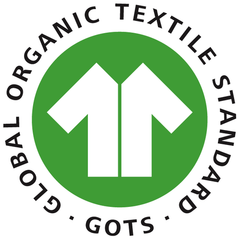
Responsible and ethical fashion labels
Share
Since the creation of Jeanne A Dit, we have always wanted to design our clothes in a socially responsible way. To guarantee our desire to produce in an eco-responsible way, Jeanne A Dit has called on an organization to certify its commitments. But not all labels are equal
In this article, we help you find your way through this jungle of organic labels to support you in your ethical and responsible purchasing!
How is ethical clothing made?
For a garment to be considered ethical, it must meet a certain number of criteria.
Ethical clothing follows a strict manufacturing process. This begins with the selection of the textile material. Ethical fashion seeks to reduce the ecological footprint of their production, by using so-called “ecological” materials. Many environmentally friendly textile fibers exist. We can find:
- Natural plant materials such as organic cotton or organic linen like the 100% cotton t-shirts from Jeanne a dit
- Natural animal materials such as wool
- Etc...
Then, a selection of the manufacturing workshop is made. For this, we check that the working conditions are acceptable, in other words that the manufacturing workshops respect their employees. To help us guarantee an ethical design, organic labels are there to guide us!
If you want to know how to recognize ethical clothing, find the article on the subject on how to identify ethical clothing?
How are labels a sign of trust?
A label is a guarantee of quality. To obtain a label, the ethical brand must be audited by an organization that issues a certification attesting that the brand respects its commitments. The issuance of a label is a sign of recognition for which the brand can communicate on it in order to highlight its ethical approach and its values.
The label can reassure the consumer because the label certifies the commitments made with regard to the product he is buying. It is a strong signal that will encourage him to trust the brand.
What are the labels that guarantee responsible fashion?

Fair Wear Foundation:
The Fair Wear Foundation label ensures monitoring and improves working conditions in clothing workshops. The organization labels companies that offer a safe working environment, decent working hours and wages. It is also this organization that labeled our organic cotton t-shirts from Jeanne A Dit.

Oeko-Tex:
The Oeko-Tex label guarantees for any consumer concerned about their health and the protection of the environment that the products they buy do not use hazardous substances in their production. It provides transparency and traceability for the consumer.

GOTS:
GOTS (Global Organic Textile Standard) is certainly the most comprehensive label. It certifies a textile nature composed of more than 95% organic fibers and attests to a manufacturing of at least 70% organic fibers. In addition, it authenticates compliance with social and environmental requirements.

PETA:
PETA (People for the Ethical Treatment of Animals) is an international non-profit organization that fights against animal abuse. The PETA label certifies that the product does not contain animal material.
Be careful! Not all labels are equal because many are influenced by lobbies.
Don’t forget that ethical clothing respects social and environmental commitments!
Discover the Jeanne a dit collection, ethical and committed fashion!
